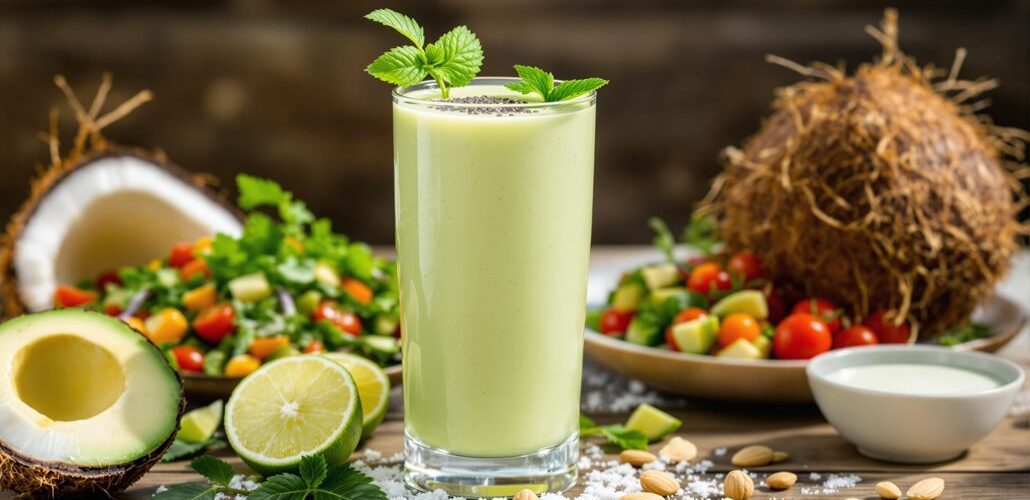
Coconut water is keto-friendly due to its low-calorie nature and electrolyte-rich profile, which aids in hydration and muscle function. With approximately 9 grams of carbohydrates per cup, it can fit into a ketogenic diet when consumed in moderation. This beverage supplies essential nutrients like potassium, sodium, and magnesium, vital for preventing dehydration-related issues such as keto flu. For ideal keto compliance, choose pure varieties with no added sugars and control portion sizes to maintain ketosis. Understanding how to balance coconut water's natural sugars while benefiting from its hydration properties is key to incorporating it effectively.
Key Takeaways
- Coconut water is low in calories, making it suitable for weight management on a keto diet.
- It contains essential electrolytes like potassium and magnesium, supporting hydration and preventing keto flu.
- Natural sugars in coconut water are acceptable in moderation within a keto framework.
- Choosing pure, unsweetened coconut water ensures compliance with keto carbohydrate limits.
- Consuming small servings, like half a cup, helps maintain ketosis while benefiting from hydration.
Ketogenic Diet Basics
Understanding the fundamentals of the ketogenic diet is vital for anyone considering this nutritional approach to health and weight management. At its core, the ketogenic diet prioritizes a significant reduction in carbohydrate intake, typically limiting it to 20-50 grams per day. This restriction is essential to induce ketosis, a metabolic state where the body shifts from using glucose as its primary energy source to burning fat and converting it into ketones.
This low-carb diet is not just about cutting carbs but also involves increasing fat consumption to approximately 70-75% of daily caloric intake, with a moderate protein intake of 20-25%. The health benefits associated with the ketogenic diet extend beyond weight loss. By lowering blood sugar levels and improving insulin sensitivity, this dietary approach can enhance overall metabolic health.
For individuals aiming to reap these benefits, maintaining the macronutrient balance is paramount. Careful meal planning and selecting foods that adhere to the macronutrient ratios guarantee the body remains in ketosis, thereby maximizing the diet's effectiveness.
While the ketogenic diet can be a potent tool for health improvement, it demands diligence and commitment to its strict dietary guidelines.
Coconut Water Nutrients
Coconut water is a nutrient-rich beverage that offers a significant electrolyte content, including approximately 600 mg of potassium and 252 mg of sodium per 240 ml serving, which supports hydration and electrolyte balance.
With around 9 grams of carbohydrates per cup, primarily from natural sugars, individuals following a ketogenic diet should consume it in moderation to maintain ketosis.
Additionally, coconut water provides small amounts of vitamins like vitamin C and minerals such as calcium, contributing to its overall nutritional benefits.
Essential Electrolytes Content
Diving into the nutrient profile of coconut water reveals its impressive content of essential electrolytes, which makes it a valuable addition to a keto diet.
Coconut water is particularly rich in potassium, providing approximately 600 mg per 240 ml serving. This high potassium content plays a vital role in regulating blood pressure and supporting heart health, especially beneficial for those on a keto diet who may experience electrolyte imbalances.
Moreover, coconut water contains around 252 mg of sodium and 60 mg of magnesium per serving, enhancing its capability to replenish lost nutrients effectively.
Coconut water also offers the advantage of being low in calories, with about 45 calories per 240 ml serving, making it a hydrating and nutrient-dense option without compromising caloric intake.
Additionally, the presence of bioactive enzymes aids in digestion and nutrient absorption, promoting overall hydration and electrolyte balance.
Key benefits include:
- 600 mg of potassium: Supports heart health and blood pressure regulation.
- 252 mg of sodium: Essential for maintaining fluid balance.
- 60 mg of magnesium: Contributes to muscle and nerve function.
- Low in calories: Suitable for those monitoring calorie intake.
- Bioactive enzymes: Enhance digestion and nutrient absorption.
Carbohydrate Profile Insights
While coconut water is celebrated for its rich electrolyte content that supports hydration and heart health, it's important to examine its carbohydrate profile for those adhering to a ketogenic diet. Coconut water contains approximately 9 grams of carbohydrates per 240 ml (1 cup) serving, with the majority originating from natural sugars. For individuals on a strict keto diet, which typically limits daily carbohydrate intake to 20-50 grams, understanding the carbohydrate content is essential. The net carb content of coconut water is about 6.4 grams per 100 ml after accounting for fiber, making it relatively low but still significant for maintaining ketosis.
However, not all coconut water is created equal. Commercial varieties can vary widely in carbohydrate content, and some contain added sugars, which can boost the carb count to as high as 21 grams per cup. This variability necessitates careful label reading and moderation to avoid interrupting ketosis.
Additionally, with coconut water being virtually fat-free and providing only about 2 grams of protein per serving, it aligns less with the high-fat, low-carb requirements of a typical keto diet. Therefore, mindful consumption is advised for those integrating coconut water into their keto regimen.
Vitamin and Antioxidant Benefits
Renowned for its array of nutrients, coconut water serves as an excellent source of essential vitamins and antioxidants that contribute greatly to overall health. Among its beneficial components, coconut water contains important vitamins and minerals, including vitamin B and vitamin C. Each serving provides approximately 8% of the recommended daily intake of these nutrients, necessary for supporting immune function and overall well-being.
Coconut water's rich antioxidant content plays a significant role in combating oxidative stress, a process linked to the development of chronic diseases. By neutralizing free radicals, these antioxidants may reduce the risk of such conditions, underscoring one of the many benefits of coconut consumption.
The drink also offers around 600 mg of potassium per cup, essential for heart health and maintaining electrolyte balance. Additionally, it contains small amounts of calcium, magnesium, and iron, which are important for bone health and energy production.
Bioactive enzymes present in coconut water further aid digestion and enhance nutrient absorption.
- Vitamins B and C: Supports immune function and overall health
- Antioxidants: Reduces oxidative stress and chronic disease risk
- Potassium: Important for heart health
- Calcium, Magnesium, Iron: Enhance bone health and energy
- Bioactive enzymes: Improve digestion and nutrient absorption
Carb Content Analysis
Understanding the carbohydrate content in coconut water is vital for those adhering to a ketogenic diet. Coconut water contains approximately 9 grams of carbohydrates per cup, derived mainly from natural sugars. This carb content can greatly impact the daily carbohydrate limits essential for maintaining ketosis. Some starchy vegetables like potatoes and corn have even higher carb content, which is why non-starchy vegetables are typically preferred.
Specifically, each 100 ml of coconut water contributes around 8.9 grams of carbohydrates, which translates to about 6.4 grams of net carbs after accounting for fiber. For individuals on a strict keto diet, consuming just one cup could occupy up to one-fifth of the recommended daily carb intake, typically ranging from 20 to 50 grams.
Moreover, many commercial coconut water products may include added sugars, further elevating the carb content; some brands reach up to 21 grams per serving. This variation underscores the importance of scrutinizing labels to guarantee compatibility with keto dietary goals.
To effectively incorporate coconut water into a keto diet, moderation is key. It is advisable to limit consumption to half a cup per day to prevent exceeding carb limits and maintain the state of ketosis. Therefore, careful consideration of coconut water's carb content can support a successful keto lifestyle.
Electrolyte Benefits
Coconut water is an excellent source of essential electrolytes, providing significant nutrients such as potassium, sodium, and magnesium that are fundamental for replenishing what is lost during physical activity.
Its natural hydration capabilities make it a suitable alternative to traditional sports drinks, offering an isotonic solution that effectively maintains fluid and electrolyte balance without added sugars.
For individuals seeking a keto-friendly option, coconut water supports hydration and muscle function, which is important for preventing keto flu symptoms, particularly during intense exercise or hot conditions.
Additionally, it enhances nutrient absorption through its bioactive enzymes.
Essential Electrolyte Replenishment
A key aspect of maintaining ideal health during a ketogenic diet is ensuring proper electrolyte replenishment, and coconut water serves as a potent ally in this regard. As carbohydrate intake decreases, electrolyte balance can be disrupted, making the consumption of coconut water an effective strategy to counteract this imbalance.
Coconut water is rich in essential electrolytes, particularly potassium, magnesium, and sodium, which are essential for maintaining hydration and overall well-being.
- Potassium Content: Coconut water provides approximately 600 mg of potassium per 240 ml serving, critical for electrolyte balance.
- Magnesium Support: With around 60 mg of magnesium, it aids muscle function and helps prevent cramps.
- Sodium Levels: The 252 mg of sodium assists in maintaining proper fluid balance and hydration.
- Cardiovascular Health: High electrolyte content supports blood pressure regulation and cardiovascular health.
- Post-Exercise Recovery: Effective in replenishing nutrients lost through sweat, aiding in muscle recovery and reducing fatigue.
Incorporating coconut water into a keto regimen can enhance recovery post-workout and support cardiovascular health. Its natural isotonic properties further enhance hydration, making it an ideal choice for those seeking electrolyte replenishment on a ketogenic diet.
Natural Hydration Source
Providing a natural and effective hydration solution, coconut water stands out due to its rich electrolyte profile, particularly potassium, sodium, and magnesium, essential for maintaining ideal fluid balance in the body.
As a keto-friendly beverage, coconut water offers approximately 600 mg of potassium per cup, which is vital for regulating blood pressure and supporting cardiovascular health. This makes it an excellent choice for individuals on a ketogenic diet, who often experience dehydration and electrolyte imbalances.
Coconut water's isotonic properties make it a superior post-exercise drink, replenishing lost fluids and electrolytes more effectively than many commercial sports drinks. With about 9 grams of carbohydrates per cup, coconut water provides a quick energy source while maintaining lower calorie content (around 45-46 calories per cup) compared to sugary alternatives.
This balance allows keto dieters to enjoy the hydration benefits without disrupting their carbohydrate intake goals.
Additionally, coconut water contains natural antioxidants that combat oxidative stress, further enhancing hydration and recovery, particularly after intense physical activity.
Its combination of hydration and electrolyte benefits positions coconut water as an ideal option for those seeking a natural, keto-friendly way to support overall health and wellness.
Choosing Natural Options
When starting on a keto diet, selecting natural options like coconut water requires careful consideration to maintain low carbohydrate intake.
Coconut water, a popular hydration choice, can be keto-friendly if chosen wisely. It's vital to focus on varieties that are pure and free of added sugars, as these can substantially increase carb intake.
Natural sugars present in coconut water are generally acceptable within a keto framework when consumed in moderation. Prioritize organic and pure varieties: These typically lack artificial additives, supporting a low-carb keto lifestyle.
Reading nutrition labels carefully is important, as some products can contain more carbs than expected. A serving of tender coconut water contains around 9 grams of carbs, so verify it aligns with your daily carb goals.
Opt for fresh coconut water: Young coconuts usually offer superior nutritional profiles compared to processed versions.
Choose brands with transparent nutritional information: Some commercial products have added sugars, sometimes exceeding 21 grams per serving.
Consider coconut maturity: Mature coconuts often have lower sugar and carbohydrate content, making them more suitable for keto.
Serving Size Considerations
When incorporating coconut water into a keto diet, portion control is vital to maintain the delicate balance required for ketosis.
A typical serving size of 120 ml contains approximately 4.5 grams of carbohydrates, making careful monitoring essential to not exceed the recommended daily carb intake of 20-50 grams.
To guarantee accurate carb tracking, it is important to verify the nutritional information on labels, as serving sizes can vary considerably between brands.
Portion Control Importance
Effective portion control is vital when incorporating coconut water into a ketogenic diet. Given that coconut water contains approximately 9 grams of carbohydrates per cup, it becomes important to regulate portion sizes to avoid exceeding the recommended daily carb intake of 20-50 grams necessary for maintaining ketosis.
Consuming a full cup can deplete about one-fifth of the 40-gram daily allowance, which underscores the importance of moderation. To benefit from coconut water's hydration and electrolyte properties without compromising ketosis, limiting intake to half a cup per day is generally advised.
- Portion sizes: Monitor carefully to guarantee carbohydrate intake aligns with dietary goals.
- Carbohydrate content: A single cup can substantially impact the daily carb limit.
- Drink coconut water: Enjoy in moderation to leverage its benefits while staying keto-compliant.
- Recommended daily limit: Half a cup is advisable to prevent disrupting ketosis.
- Commercial variations: Be cautious of added sugars in some brands, which may increase carb counts.
Carb Monitoring Necessity
Understanding portion control is just the beginning when incorporating coconut water into a ketogenic diet. Carb monitoring is essential due to coconut water's carbohydrate content, which stands at approximately 9 grams per cup. For those adhering to stricter daily carb limits of 20-50 grams, half a cup of coconut water can consume a significant portion of the allowance. This makes meticulous serving size consideration a priority for maintaining ketosis.
| Serving Size | Carbs (grams) | Daily Carb % (20g limit) |
|---|---|---|
| 1 Cup | 9 | 45% |
| 3/4 Cup | 6.75 | 33.75% |
| 1/2 Cup | 4.5 | 22.5% |
| 1/4 Cup | 2.25 | 11.25% |
| 1/8 Cup | 1.125 | 5.625% |
Close carb monitoring is crucial given the potential for commercial coconut water varieties to contain added sugars, which can elevate carb content. Practicing mindful label reading helps in avoiding unintended carb increases. In addition, balancing coconut water with other low-carb beverages enables better management of daily carb intake. By adjusting the consumption of other carb sources, individuals can enjoy the hydrating benefits of coconut water while adhering to their keto diet's requirements.
Timing of Consumption
In optimizing the benefits of coconut water within a keto-friendly diet, timing its consumption is essential. Careful planning around when to drink coconut water maximizes its potential for hydration without disrupting your carb intake.
Coconut water is an excellent source of electrolytes, making it particularly useful to consume around workout times. Its potassium-rich profile aids in replenishing electrolytes lost during exercise, thereby supporting hydration and recovery. Post-exercise consumption can also help mitigate muscle cramps and fatigue.
Here are practical tips for timing coconut water consumption:
- Post-Exercise: Drink after workouts to support electrolyte balance and muscle recovery.
- Morning: Start your day with coconut water to rehydrate after overnight fasting.
- With Meals: Pair coconut water with low-carb meals to manage carbohydrate intake effectively.
- Avoid During Fasts: Refrain from consuming coconut water during strict fasting to maintain ketosis.
- Pre-Meal Caution: Avoid before high-carb meals to prevent exceeding carb limits.
Coconut Water Alternatives
For individuals adhering to a ketogenic diet, finding suitable alternatives to coconut water is vital to maintain ketosis while still benefiting from hydration and electrolyte balance.
Coconut milk is a viable keto-friendly option, as it is low in carbohydrates and high in healthy fats, making it an excellent substitute when a creamy texture is desired in recipes. Similarly, unsweetened coconut cream offers a rich flavor profile and a high-fat content with minimal carbohydrates, aligning perfectly with the macro-nutrient requirements of a ketogenic diet.
Additionally, incorporating electrolyte balance through supplements can effectively replicate the hydration benefits of coconut water without contributing to carbohydrate intake. These supplements are instrumental in maintaining electrolyte balance, significant for overall health on a keto diet.
Additionally, herbal teas like peppermint or chamomile provide low-carb hydration options that do not disrupt ketosis.
For a revitalizing alternative, sparkling water with a splash of lime or lemon juice offers a keto-friendly beverage, promoting hydration without introducing significant carbohydrates.
These alternatives to coconut water guarantee that individuals on a ketogenic diet can stay hydrated while adhering to their dietary restrictions.
Maintaining Ketosis
Successfully maintaining ketosis on a ketogenic diet requires careful attention to carbohydrate intake, including the consideration of beverages like coconut water. To remain in ketosis, daily carbohydrate consumption should generally be restricted to 20-50 grams, as exceeding this disrupts ketone production.
Coconut water contains approximately 9 grams of carbs per cup, suggesting that moderation is key. Consuming coconut water in small amounts, such as half a cup, may help manage carb intake while still benefiting from its hydration and electrolyte properties.
Regularly monitoring ketone levels with blood, urine, or breath meters can guarantee you're staying within the ideal ketosis range of 1.5 to 3.0 mmol/L.
When incorporating coconut water into a keto diet, consider the following practical strategies:
- Limit Intake: Restrict consumption to half a cup to keep carb levels within safe daily limits.
- Select Pure Options: Choose coconut water without added sugars to prevent unnecessary carb intake.
- Monitor Daily Carbs: Confirm total daily carb consumption does not exceed 40 grams to avoid disrupting ketosis.
- Balance with Other Beverages: Complement coconut water with other low-carb drinks to maintain hydration without excess carbs.
- Adjust Diet Accordingly: Modify other meals to accommodate the carbohydrate content of coconut water, keeping the overall balance in check.
Careful planning and mindful consumption can allow individuals to enjoy coconut water without compromising their keto goals.
Health Benefits Overview
Coconut water offers a multitude of health benefits that can complement a ketogenic lifestyle, primarily due to its rich electrolyte content.
Particularly, a single cup delivers approximately 600 mg of potassium, an essential electrolyte that supports hydration and heart health, which are critical on a keto diet that often leads to increased fluid loss. Enhanced hydration from coconut water can help maintain electrolyte balance and mitigate common keto side effects such as fatigue and muscle cramps.
Additionally, the ketogenic diet is known to stabilize blood sugar levels, which can further support those managing type 2 diabetes.
Beyond hydration, coconut water contains natural antioxidants that combat oxidative stress, promoting overall well-being.
This can be especially beneficial for individuals engaging in regular physical activity, as it may enhance recovery and reduce exercise-induced inflammation.
With about 9 grams of carbohydrates per cup, coconut water can be integrated into a keto diet when consumed in moderation, ensuring that it complements daily carbohydrate goals.
Moreover, the bioactive enzymes in coconut water may facilitate digestion and improve nutrient absorption, which is advantageous for metabolic health.
Its low-calorie profile, around 45 calories per cup, makes it an excellent alternative to sugary beverages, aiding in weight management while ensuring adequate hydration.
Consequently, coconut water is a practical addition to a keto-friendly diet.
Frequently Asked Questions
Is Coconut Water Ok on a Keto Diet?
Coconut water, when consumed in moderation, can support keto hydration through its electrolyte balance, offering benefits like potassium and magnesium. However, due to its carb content, consider low carb alternatives to maintain ketosis effectively.
Does Coconut Help Ketosis?
Coconut can aid ketosis through its benefits such as providing hydration sources and maintaining electrolyte balance. The medium chain triglycerides (MCTs) in coconut support energy and ketone production, potentially enhancing ketosis effects when consumed appropriately.
Does Coconut Water Have Too Many Carbs?
Coconut water's carbohydrate content can challenge keto compliance, yet its hydration benefits and electrolyte balance offer advantages. Calorie comparison with other drinks shows it's relatively low-calorie, but moderation is essential to maintain ketosis while enjoying its attributes.
Is Coconut Water Too High in Sugar?
Coconut water's natural sugars can be high for strict keto diets, potentially disrupting ketosis. While offering hydration and electrolytes as benefits, considering sugar alternatives and other ketogenic beverages might provide more suitable hydration sources for such dietary regimens.
Conclusion
Coconut water can be integrated into a ketogenic diet with careful consideration of its carbohydrate content. Its electrolyte benefits, particularly potassium and magnesium, support hydration and muscle function, vital for those following low-carb regimens. Selecting natural, unsweetened options is essential to minimize added sugars and maintain ketosis. Timing consumption around physical activity may enhance its benefits. For individuals adhering to ketogenic principles, coconut water can be a viable option when consumed in moderation alongside other low-carb alternatives.










No Comments